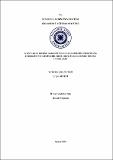DSpace Repository
K-EN YAKIN KOMŞU ALGORİTMASI İLE EKONOMİK ÖZGÜRLÜK ENDEKSİNİN TAHMİN EDİLMESİ: OECD ÜLKELERİNDE ÖRNEK UYGULAMA
JavaScript is disabled for your browser. Some features of this site may not work without it.
| dc.contributor.author | DEVECİ, Ergin
|
|
| dc.date.accessioned | 2021-05-04T09:19:20Z | |
| dc.date.available | 2021-05-04T09:19:20Z | |
| dc.date.issued | 2020 | |
| dc.identifier.uri | http://hdl.handle.net/11547/7552 | |
| dc.subject | OECD, | tr_TR |
| dc.subject | Import | tr_TR |
| dc.subject | Export | tr_TR |
| dc.subject | Unemployment | tr_TR |
| dc.subject | Inflation | tr_TR |
| dc.subject | Index | tr_TR |
| dc.subject | Economic Index | tr_TR |
| dc.title | K-EN YAKIN KOMŞU ALGORİTMASI İLE EKONOMİK ÖZGÜRLÜK ENDEKSİNİN TAHMİN EDİLMESİ: OECD ÜLKELERİNDE ÖRNEK UYGULAMA | tr_TR |
| dc.type | Thesis | tr_TR |
| dc.description.abstractol | This study is to predict 2017 economic freedom index categories of 36 OECD countries including Turkey by the help of k-nearest neighbor (k-NN) algorithm using the data for 2016. For this purpose, four basic macro-economic indicators (import, export, unemployment and inflation) and economic freedom scores were used. In other words, with the help of analysis implemented with these variables, the economic freedom categories of 36 OECD countries were predicted for the year 2017. In this study, which uses one of the classification methods, the k-NN algorithm, evaluations were made for different k values to measure the sensitivity of k parameter. In this study, first the distances of each data to the predicted data were calculated for different k values, the determined distances were arranged from nearest to farthest, and the neighborhoods were determined based on the closest distance. Data with the nearest distance is labeled as 1. neighbor, data with the farthest distance is labeled as the n. neighbor (n is the total number of data). In this context, k closest neighbor classes (categories) were collected and then the most suitable neighbor category is predicted. In other words, by the help of k-NN algorithm for different k values with macroeconomic variables and economic freedom scores, the economic freedom categories of OECD countries for 2017 were estimated and compared with their real categories. In addition to these, a literature review of the previous years related to the k-NN algorithm and economic freedoms has been done. According to the findings obtained from the study; algorithm made the correct prediction for the seven countries (Belgium, Germany, Latvia, Luxembourg, Norway, Spain and Turkey). In addition, algorithm did not make the correct prediction for two countries such as Greece and Slovenia. One of the most interesting discoveries in this study that 80.5% success was achieved for k = 1 value | tr_TR |
Files in this item
This item appears in the following Collection(s)
-
Tezler -- Thesis [3470]
